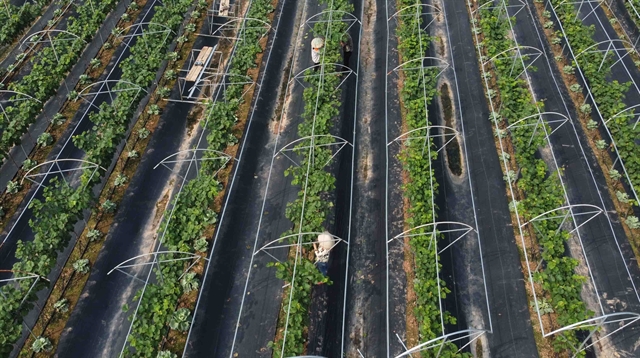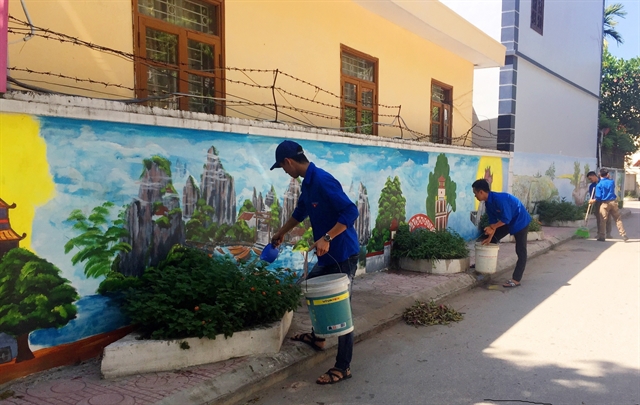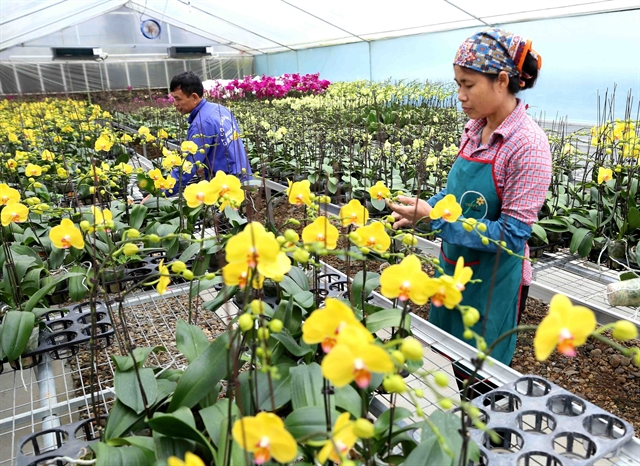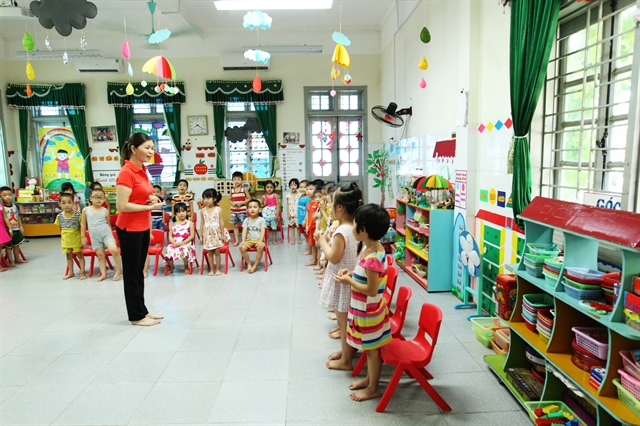 Society
Society

 |
| Nguyễn Hữu Hội's household in Đan Phượng district, transformed inefficient rice-growing land into a grape plantation to adapt to climate change, resulting in high economic efficiency. VNA/VNS Photos |
HÀ NỘI — Over the years, Đan Phượng, a district in the northwest of Hà Nội, has transformed into a model new rural area, with clean and beautiful infrastructure, greenery, and modern amenities.
The district's achievements have been recognised on multiple occasions, and it continues to strive for further improvements.
The district's success in meeting the new model rural standards has been a result of mobilising various resources, including active participation from the people as the driving force. Additionally, support from the Central Government and the capital city has been instrumental in facilitating the development process.
Key initiatives, such as the construction of the Ring 4 road project, have been completed, which is crucial for improving connectivity and accessibility within the district. Moreover, the focus on developing schools to meet national standards demonstrates the commitment to providing quality education to the residents.
One of the notable aspects of Đan Phượng's progress is the successful development of effective production and business cooperative models. The emphasis on hi-tech agriculture has led to the creation of exemplary models like the Cuối Quý organic vegetable production cooperative. This not only contributes to the district's economic growth but also helps promote clean and sustainable food production.
 |
| Đan Phượng district's initiatives such as painting murals, building flower roads, installing house number plates, and naming roads have become widespread across the capital city. |
Furthermore, the development of eco-tourism and experience tourism has provided additional income sources for local households. The combination of farming black grapes with tourism has proven to be a successful model, allowing families to earn dual incomes and boosting the district's overall economic growth.
Đặng Thị Cuối, Director of the Cooperative, proudly shared that on a daily basis, they harvested 2-4 quintals of vegetables, supplying them to clean food stores, kindergartens, primary schools, and industrial parks.
Cuối Quý vegetable brand has gained widespread recognition, leading to traders eagerly queuing to buy their produce. However, the demand often outstrips supply.
Meanwhile, at Nguyễn Hữu Hợi’s vineyard in the district, visitors are delighted by the bountiful bunches of grapes, ripe and juicy. The vineyard opens its doors to guests from early morning to late afternoon, welcoming them to take pictures, check in, and purchase large, delicious bunches of grapes to enjoy or share with friends and relatives.
 |
| Đan Hoài Cooperative in Phùng Town (Đan Phượng District) stands as one of the first hi-tech orchid growing models in Hà Nội, serving as a prime example of urban agriculture development. |
Hợi, the owner of the vineyard, shared that his family not only sold grapes but also organised experience tours for visitors. The vineyard received several dozen guests on an average day, with weekends and holidays often seeing hundreds of visitors.
Interestingly, in the wider area of Đan Phượng District, numerous other families are adopting a similar model by combining black grape cultivation with eco-tourism and experience tourism. This dual source of income from green and ecological farming practices has generated much excitement among households.
The application of science and technology in agricultural production, particularly through cooperatives, has significantly increased productivity and improved the income of producers. As a result, these efforts contribute significantly to building Đan Phượng District as a model new rural area.
 |
| The construction of schools meeting national standards at level 2 is a priority in Đan Phượng District. Currently, 39 out of 55 schools in the district have achieved national standards at level 2, accounting for 70.9 per cent of schools. |
Lê Thành Nam, Chairman of Đan Phượng District People's Committee, emphasised the commitment of the district to prioritise new rural construction as a key political task, and they approach it with creativity and innovation.
Specifically, during the period of 2021 - 2025, right from the beginning of his term, the district has been unwavering in its focus on directing economic development while building a model new countryside that aligns with the principles of civilisation and modernity, in line with the developmental criteria of a progressive district.
Furthermore, the district has implemented supportive policies that aim to bolster agricultural production and quality. They actively encourage the establishment of collective labels for agricultural products such as vegetables, fruit trees, pork, tofu, and wine, enabling local products to gain wider recognition and trust among consumers.
Additionally, the district fosters the development of fruit tree planting models in line with VietGAP standards, ensuring that agricultural practices meet the highest quality and safety requirements.
The article is published with coordination of the Coordination Office of the New-Style Rural Development Programme in Hà Nội. — VNS




